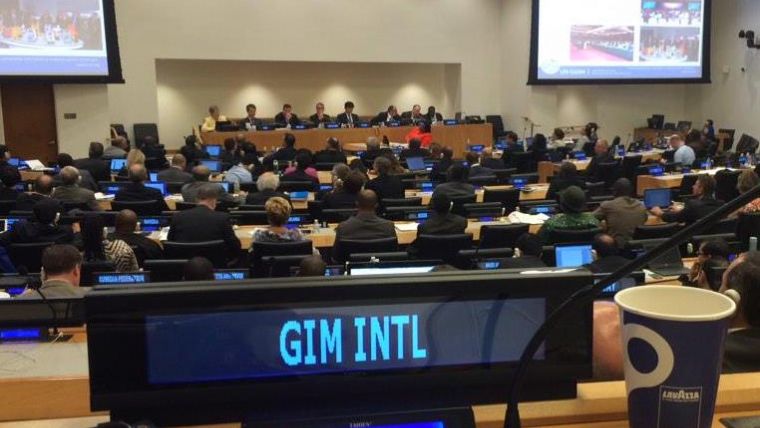Geospatial Data to Support Achievement of Sustainable Development Goals
Review of 5th Meeting of UN-GGIM Committee of Experts in New York
The 5th meeting of the UN Committee of Experts on Global Geospatial Information Management (UN-GGIM) made firm steps towards establishing itself as a permanent UN body. It once again emphasised the crucial role of geospatial information, especially in terms of achieving the Sustainable Development Goals agreed by the Member States of the UN and also economic growth for citizens in the developing world.
The 5th session of UN-GGIM concluded its deliberations on 7 August 2015 with 13 intergovernmental decisions being unanimously adopted. This followed a week that featured 27 well-attended and interactive side events, including technical workshops and information sessions as well as a map/poster exhibition, and the formal review of 13 substantive reports. This year’s session of the Committee brought together over 290 participants consisting of ministers, heads of national mapping agencies, geospatial information management authorities and industry observers from over 85 countries.
2030 Sustainable Development Agenda
The Committee discussed ways to achieve greater integration of information systems in support of the 2030 Sustainable Development Agenda. In order to effectively measure, monitor and mitigate sustainable development it is necessary to use geospatial information to link together demographic, statistical and environmental data. The Committee of Experts has been monitoring the dialogue surrounding the Sustainable Development and Post-2015 Development Agenda from a geospatial perspective. The current debate on a new United Nations Development Agenda provided a unique opportunity for the Committee to raise the visibility and awareness of the importance of geospatial information as an enabler of sustainable development. In fact, the importance of geospatial data for the Post-2015 Development Agenda was acknowledged and understood when 193 Member States agreed on the new UN Sustainable Development Agenda. Geospatial information features twice in the so-called outcome document entitled ‘Transforming our World: The 2030 Agenda for Sustainable Development’. While encouraged by the increasing recognition of geospatial information, the Committee of Experts agreed that the understanding and use of geographic and geospatial information in sustainable development, particularly at the policy and decision-making levels, needs to be further enhanced, and encouraged Member States to ensure that the initiatives and activities related to sustainable development include geospatial information within their respective national frameworks.
Mandate after 2016
UN-GGIM is working on a 5-year review report to be presented to the Economic and Social Council of the UN (ECOSOC), as the umbrella under which it is currently acting, in the spring of 2016. According to the delegates, UN-GGIM is well placed to continue to contribute even more to the work of the United Nations, especially in the context of the implementation of the Sustainable Development Agenda and the follow-up to the World Conference on Disaster Risk Reduction. The Committee agreed that a strong mandate after 2016 is appropriate and necessary in order to interact more effectively on coordinating the field of geospatial information management in the broader UN system.
GGRF and shared guiding principles
Following the General Assembly resolution on a Global Geodetic Reference Frame for Sustainable Development in February 2015 – which was the first geospatial resolution to be adopted – the Committee is now working on an implementation strategy. In other areas, the Committee also concluded several years of work by adopting a statement of shared guiding principles for geospatial information management and technical guides on the use of international geospatial standards.
Land administration
Land administration has been acknowledged by UN-GGIM as an important topic for its next meetings since the level of land administration and governance varies greatly across Member States. An expert group will prepare all the work needed to increase and strengthen the role of land administration and good land governance within UN-GGIM, while at the same time looking to cooperate with other UN bodies and international organisations.
UN GGIM Africa
The Committee created UN-GGIM: Africa as its fifth regional chapter and thus completed its regional support architecture in line with the UN Regional Commission structure. In this context the Committee welcomed the offer by the Economic Commission for Africa to host next year’s UN-GGIM High-Level-Forum in Addis Ababa, Ethiopia, from 20-22 April 2016, with an overarching theme on land administration and management.
Fundamental data themes
The Committee considered a proposal put forward by UN-GGIM Europe on the determination of fundamental data. UN GGIM Europe proposed that national and regional examples of fundamental data theme initiatives should be the basis for developing agreement on a set of global fundamental geospatial data themes. These themes should be harmonised in order to be able to measure, monitor and manage sustainable development consistently over time and for evidence-based decision-making and policymaking. The proposal received the support of the UN Member States and it was agreed that the determination of global fundamental data themes should be added as a work item for the Committee to take forward for the coming year, led by UN-GGIM: Europe.
Next session
The sixth session of the Committee of Experts will be convened at United Nations Headquarters in New York from 3-5 August 2016.
Acknowledgement
Thanks are due to Greg Scott, Inter-Regional Advisor, UN-GGIM at United Nations.

Value staying current with geomatics?
Stay on the map with our expertly curated newsletters.
We provide educational insights, industry updates, and inspiring stories to help you learn, grow, and reach your full potential in your field. Don't miss out - subscribe today and ensure you're always informed, educated, and inspired.
Choose your newsletter(s)
























